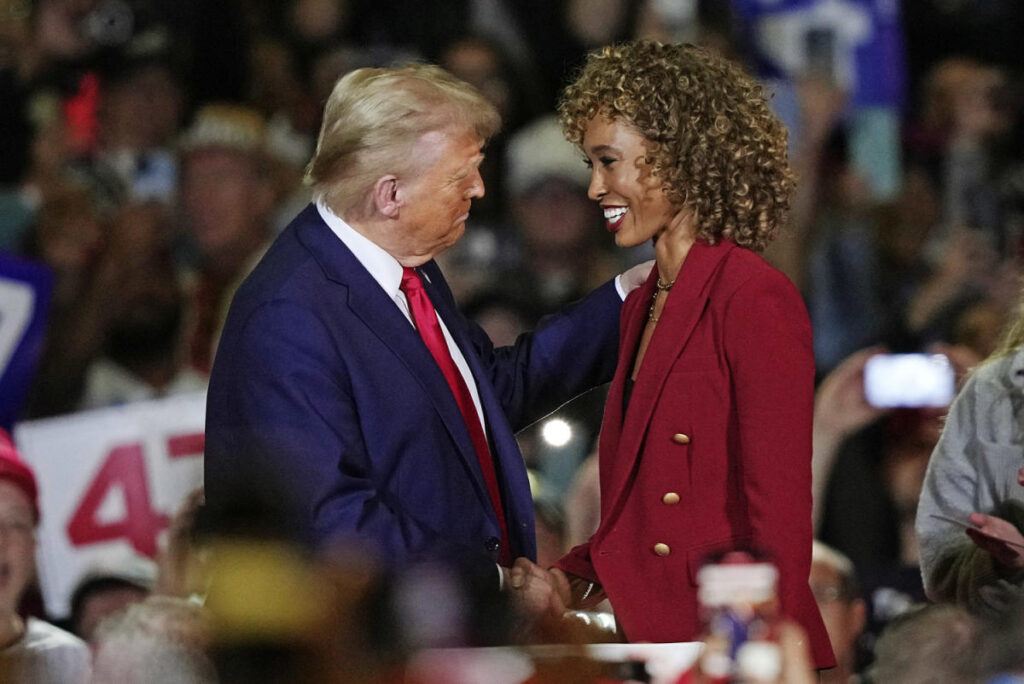Donald Trump’s campaign strategy is shifting toward a more personalized approach, as his advisors advocate for town hall-style forums rather than the larger rallies he typically favors. This strategic pivot aims to help close a significant gender gap in support, particularly in light of the 2024 presidential election where his opponent, Vice President Kamala Harris, represents a historic candidacy as the first woman and woman of color potentially elected to the presidency. Trump’s reluctance to engage in the more intimate town hall format is sometimes visible, exemplified by instances where he chose to dance rather than interact with the audience. However, the campaign recognizes the potential of women moderators and a female-heavy audience to create a more relatable environment.
To engage female voters, Trump’s team has enlisted a roster of high-profile women, including political figures such as Sen. Marsha Blackburn and Govs. Sarah Huckabee Sanders and Kristi Noem. These town hall events, strategically moderated by women, are intentionally designed to address issues that resonate with female voters. The approach highlights a softer side of Trump and seeks to engage conversations around topics women care about, which has been a critical shift in his messaging and presentation during this election cycle.
Recent polling indicates a stark disparity in gender support for Trump and Harris, with women leaning towards Harris by a 14-point margin while men favored Trump by 16 points. Abortion has emerged as a pivotal issue influencing voter sentiments, particularly among women. The consequences of the GOP’s stances on this matter have led Democratic strategists to believe that Kamala Harris embodies the values and experiences of women, presenting a stark contrast to Trump’s record and rhetoric, which have often been polarizing.
Despite the strategic rebranding through town halls, there remains skepticism regarding their effectiveness in mending Trump’s relationship with female voters. The campaign’s effort has focused on friendly moderators and a supportive audience, often minimizing tough questions or critiques. This careful curation of the town hall atmosphere is viewed as essential to avoiding potential missteps that could further alienate women, especially amid Trump’s history of controversial remarks and actions toward women. The choice of Republican moderators ensures alignment and reduces the likelihood of challenging inquiries that could expose vulnerabilities.
The town halls have generated notable moments, both effectual and uncomfortable. For instance, Gov. Huckabee Sanders faced backlash for comments associated with Harris’s decision not to have children, while Trump’s divergence into playing music instead of engaging in structured Q&A at times raised eyebrows regarding his focus and fitness for the presidency. Some events have devolved into awkward interactions, such as when Trump mischaracterized certain topics but was salvaged by accommodating moderators who redirected conversations back on track. These episodes have sparked discussions about the nature of Trump’s campaign and his ongoing appeal to various voter demographics.
Ultimately, Trump’s initial hesitation toward the town hall format appears to be waning as he adapts to the benefits of such interactions. Insights from individuals close to the campaign suggest that he has come to appreciate the positive coverage and reception of town halls compared to the usual rally environment. As the campaign progresses, these intimate gatherings may play a pivotal role in determining his ability to court support from undecided voters, particularly women, and reshape his public persona just ahead of the 2024 election. The outcome of this shift remains uncertain, but it represents a significant adjustment to not only his engagement strategy but also the overall campaign narrative in a highly competitive political landscape.

